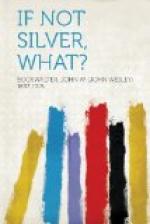Professor Pierson also points out the great error of assuming that the black and yellow races will fade away before the white, and shows it to be far more likely that with the increased security afforded by British and Russian rule they will increase so rapidly as to industrially force the white race back to the higher latitudes of the north temperate zone. Industrial commonwealths will not dispense with great armies—at least not for a long time—but China has passed the militant age, and reached the purely industrial. It may be said that work is a pleasure to the Chinese, as active sports are to Western people. Continuous toil is looked upon as a matter of course. To them it does not seem a hardship that men should work. As a measure of the possibilities of the Orient, consider what has been done in the western world within half a century, where the population is much less than one-half of that of the far East. Over four hundred thousand miles of railroad have been constructed, together with a vast, almost incalculable system of telegraphs, to say nothing of the great cities and common roads, or the enormous mass of productive machinery, which has even outrun the increase of population.
In round numbers, some forty thousand millions in capital have been absorbed in railroads alone. Add the amount absorbed in telegraphs, telephones, steamships, and electric plants, and a thousand and one appliances of civilization, and the total is beyond comprehension. And all these things have yet to be created and adopted in the Oriental countries. How rapidly the development may go on there, and what an enormous mass of capital will be absorbed, is clearly indicated by what has been done in a very few recent years. And so far we have left Africa entirely out of the account, a country with a vast population and richly dowered with natural resources and with a capacity for rapid development.
Possibly the Orientals will not suddenly become progressive to the degree here anticipated, though Russia’s eastern march has fairly rivalled our western march; and it must be borne in mind that to develop the appliances of western civilization we had all the experiments to make, all the crude preliminary work to do in creating the system, which the Orient will receive from us in its present perfected form, and be able to go on without any mistakes, and thus enable them to adopt within a very brief time that which we gave the labors of several generations to discover, develop, and apply.




